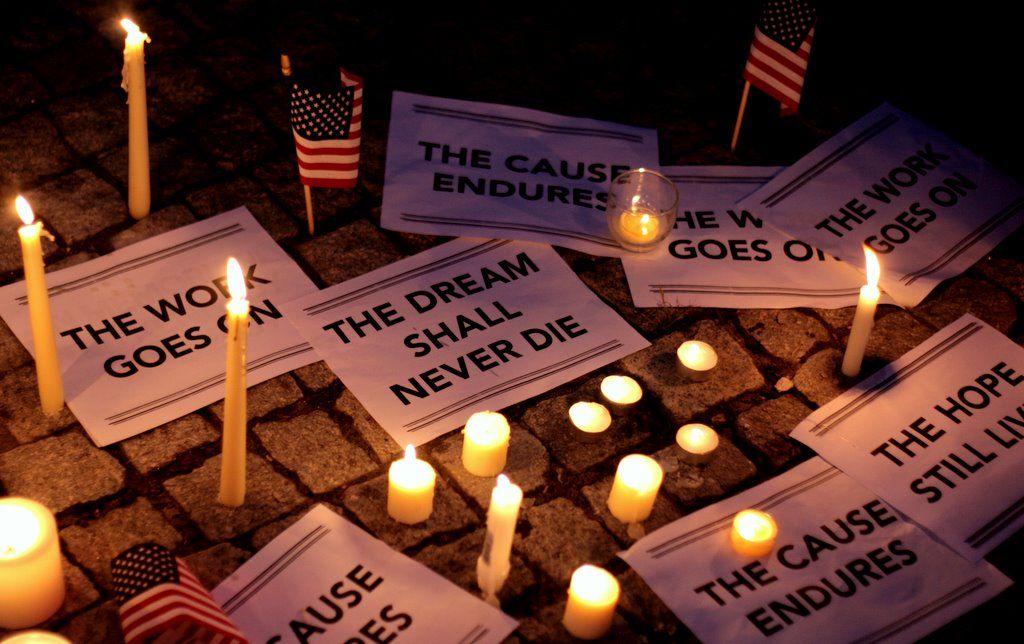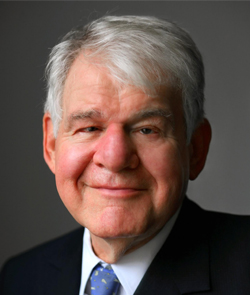
Vigil for Sen. Edward M. Kennedy (D-MA), Aug. 26, 2009 (Credit: GoPiloGo / Flickr CC 2.0)
Bill Josephson is one of my oldest friends. We met in 1961 when we were founding organizers of the Peace Corps. We’ve been close ever since. We differed in our reaction to the election and from our exchange of emails he on his own initiative wrote this piece — “the most personal essay I’ve ever written,” he told me. I asked him to let us post it and he agreed.
— Bill Moyers
My reaction to the 2016 election, after the initial shock, has been philosophical. I keep thinking about Boethius’ The Consolation of Philosophy, which I have not thought about for a very, very long time. That it was written in prison somehow also seems significant to me. I also frequently think about Maimonides’ Guide for the Perplexed — but especially now.
I have been teaching University of Chicago undergraduates — all Sargent Shriver Public Service Leadership Fellows — for three years now. The Nov. 11 class was very emotional. We junked the syllabus. We talked pretty much only about the election. Two of the women could not talk about it without sobbing. Another woman refused any future dialogue, despite my entreaties that dialogue was more important than ever. Most of the men were silent.
The day before, coming out of a meeting at the Institute of Politics, I encountered David Axelrod, the chief strategist for Barack Obama’s election. He didn’t look happy. I said, “’68 was worse.” He looked blank. I said, “I was there.”
’68 was worse. Three political assassinations (I count the effects of George Lincoln Rockwell’s 1967 murder as carrying over into the next year). A raging war that was to continue for five more years. The Nixon/Kissinger back channel to the South Vietnamese president that sabotaged the peace negotiations in Paris to end the war. The election of a truly smart and truly evil president.
We survived and even prospered in the ’80s, ’90s, the ’00s and ’10s, despite the financial collapse and two recessions and a series of mediocre presidents, except for Barack Obama, a good president and a good man who does not deserve to be succeeded by Donald J. Trump.
But Wilson did not deserve to be succeeded by Harding, nor Johnson by Nixon, nor Clinton by Bush. That’s politics.
The presidency can make the man, as it did with Lincoln and Truman. It can also unmake him, as it did with Hoover and Carter.
I am not an apologist for Trump. No one has set forth his failings better than the editors of The New Yorker. His idiosyncratic behavior appears to continue almost unabated.
But I have to disagree with just about everything said in Neal Gabler’s “Farewell America” on BillMoyers.com. Trump has not “shredded” anything. The United States is not likely to be a “pariah country.”
Gabler says, “Maybe we will [survive this], but we won’t survive unscathed.” No one survives anything unscathed.
Nor is it true that “Democracy can’t cope with extremism.” The United States and most of the rest of the world did very well indeed from 1945 until now and hopefully will continue to do so.
Nor is it true that “Only violence and time” can defeat extremism. I hope Gabler is not advocating violence.
The election was hateful, but so were, for but two recent examples, President Obama’s and many others before. Hate has been directed by Americans at Italians, Irish, Jews, blacks — now Muslims and others.
What Gabler says about the failures of the media is true, but not enough.
Future candidates will have to learn from scratch about how to cope with the disinformation of the social media and how to use social media effectively and responsibly.
The realities of this election include the fact that, overall, turnout seems to be creeping up to the current norm (disgraceful as it is) of under 60 percent of eligible voters.
One fact sticks in my mind: Mitt Romney got essentially the same number of votes in 2012 that Trump did.
The fact is that the supporters of Hillary, as we know, did not vote in the numbers they could have. Obama got almost 66 million in 2012, down from 69 million plus in 2008. He would have beat Trump’s 62 million.
Hillary got 63 million plus, 2.5 million more than Trump and more than Gore’s 500,000 more than W.
Writing in The New York Times in an article entitled “Many in Milwaukee Neighborhood Didn’t Vote — and Don’t Regret It,” Sabrina Tavernise says almost all that I think needs to be said about that: We have only ourselves to blame.
I would add that a piece by Quoctrung Bui, “An Unwelcome Exodus,” graphically shows how lack of economic opportunity in most of the states Trump carried brought about an exodus from them of college graduates.
Bill Moyers has raised with me questions about the Electoral College. I do not believe in causes that are lost, let alone at the beginning. No constitutional amendment to abolish or change the Electoral College will pass the House and Senate by the required two-thirds. Nor will it be ratified by three-quarters of the states.
Can the College be ameliorated? Some people advocate dividing each state’s electoral votes in some proportion to the state’s popular vote, as Maine and Nebraska do, instead of the current winner-take-all in all the other states. That would be fairer and probably would have resulted in Clinton (and Gore) victories, although I have not done the counting. But it would require unlikely action by the states legislatures and governors, now — thanks to Democratic Party oversight — overwhelmingly Republican.
It would also result in more recounts, which may not be bad if the US Supreme Court would let the states do their constitutional job, as it did not do in the case of Florida in 2000. (Incidentally, a recent conversation with one of Justice O’Connor’s colleagues produced an emphatic denial of the rumor that she had recanted her position in Bush v. Gore.)
National Popular Vote has the support of 11 states and DC with 165 electoral votes, plus The New York Times. If states with an Electoral College majority — 270 — should join, they would agree to vote their electors for the national popular vote winner. This is not a bad idea, but the current proposal is vitally flawed.
I’ve written to The Times about these flaws so many times (no pun) that it now seems pointless.
New York Gov. Andrew Cuomo had an opportunity this session to lead an effort to correct its flaws in the design of the National Popular Vote. Instead, on Nov. 7, he signed a bill making permanent New York’s commitment to NPV as it now exists and issued a jingoistic press release — the opening, perhaps, of his 2020 presidential campaign.
The National Popular Vote effort seems stalled.
Some have talked about the electors exercising their discretion to vote their consciences, notwithstanding their respective states’ popular votes, as the Framers thought they would and should. Last time I looked, about half the states purported to bind their electors, one way or another, to vote in accordance with their states’ popular vote. That probably has not much changed. The Uniform Laws Commissioners fairly recently proposed to the states a statute to bind electors. Only three states, Minnesota, Montana and Nevada adopted it.
Let’s look to the future.
Two matters for which we can be grateful to Trump. In the primaries, he ended the Bush “dynasty.” In the general election, he ended the Clinton “dynasty.”
Twenty-five Democratic senators are to be elected in 2018 (and consequently only 10 Republicans counting the Sessions vacancy). Ten are from states Trump carried: Florida, Indiana, Michigan, Missouri, Montana, North Dakota, Ohio, Pennsylvania, West Virginia and Wisconsin. Only 10 are from arguably, repeat arguably, “safe” states as Democrats see them, but perhaps there are no safe states anymore.
Putting tea party and Trump primaries to one side, all the Republican senators are from safe states, except Sen. Jeff Flake in Arizona, and he is actually quite independent.
Then, whom will Democrats run in 2020?
Fifty-six years ago this month, the late Warren W. Wiggins and I were challenged by John Kennedy’s New Frontiersmen to come up with a plan to create the Peace Corps – if we could, they said skeptically. The result was a paper that Warren later titled “The Towering Task,” after a phrase in President Kennedy’s first State of the Union address. Against all odds, the Peace Corps was born of that challenge and thrived.
Many times in my life I have paused to contemplate the tasks still towering above us. This is such a time. I am reminded of the Crisis Papers. I am reminded of Christina Rosetti’s poem about the road winding upward all the way, about the journey taking the whole long day.
Gabler quotes some lines from Auden’s “September 1, 1939,” the day Hitler invaded Poland.
I also quote those lines:
Defenseless under the night
Our world in stupor lies;
Yet, dotted everywhere,
Ironic points of light
Flash out wherever the Just
Exchange their messages:
May I, composed like them
Of Eros and of dust,
Beleaguered by the same
Negation and despair
Show an affirming flame.
But unlike Gabler, I am not hunting for that affirming flame. I have always believed in it. I still do.
And in addition to Auden, Boethius and Maimonides, I think about Vince Lombardi:
When the going gets tough, the tough get going.




